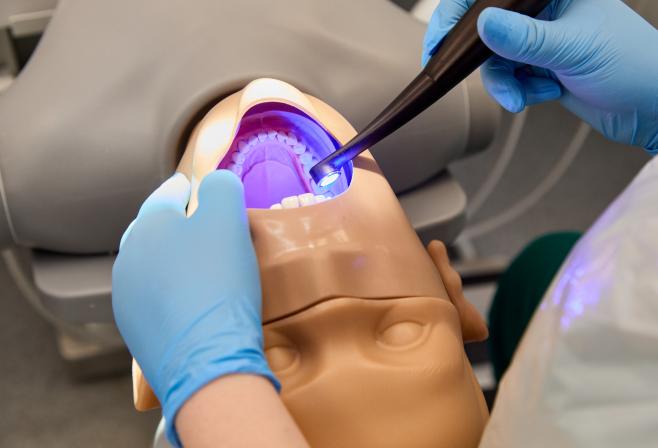You are here
New plans for dental training reform in England to tackle inequalities in patient oral health
21 September 2021

An ambitious four-year plan to develop a workforce more able to address oral health inequalities across the population by reforming dental education and training, was published today by Health Education England.
The Advancing Dental Care (ADC) Review report concludes a three-year review to identify and develop a future dental education and training infrastructure that produces a skilled multi-professional oral health workforce, which can support patient and population needs within the NHS.
HEE has worked and engaged with trainees, patients and other stakeholders to devise a detailed plan for reforming dental training, which includes widening access to dental careers and understanding the oral health needs of patients in specific communities so the skills and competencies of the workforce can be targeted where they are most needed.
Earlier findings of the Review recognised that the existing postgraduate training programme was too rigid and often unable to meet the expectations of trainees and the changing oral healthcare needs of the population. This research also found that, though the oral health of the general population is improving, inequalities still exist across some population groups including the elderly; vulnerable people and deprived communities who require targeted or specialist dental care. There is also a need to have a workforce that reflects the cultural diversity of the populations it serves.
Over the next four years, HEE will continue to work collaboratively with system partners to deliver the recommendations of the ADC Review report which include:
Flexible working
- Digital and blended learning opportunities to deliver dental education and training.
- Options for less than full time training and career breaks which can support differing lifestyles and wellbeing of trainees.
- Flexible models of Dental Core and Specialty Training to support workforce retention and career progression and an equitable distribution of postgraduate dental training places.
Skills development
- Giving trainees diverse experience of managing complex care, co-morbidities, and a stronger understanding of the communities they serve in changing care models and pathways.
- Better use of the skill mix of the dental workforce and multi-disciplinary team working, to improve alignment of patients’ needs to appropriately qualified practitioners and enabling dental care professionals to work to their full Scope of Practice.
- Options for qualified dentists and dental care professionals to increase their knowledge and skills and develop new capabilities and competence, including leadership, management, and research.
Widening access and participation
- More flexible entry routes into training, to widen access and participation and develop more dental professionals in areas of greatest need.
- Supporting the development of apprenticeships to diversify and promote the concept of a local dental workforce approach.
- Co-ordination and distribution of postgraduate training posts so that it is better aligned to areas with the highest levels of oral health inequalities.
Professor Wendy Reid, Executive Director of Education & Quality and Medical Director at HEE, said: “The blueprint for HEE’s programme of reform has been shaped by patients and trainees who participated in the ADC Review and we are very grateful for their invaluable input. At the heart of our proposals is working with partners, in an evolving NHS context, to achieve our vision for an agile multi-professional oral health workforce.
“The three-year ADC Review has identified inequalities in population oral health in different communities and that oral health needs are changing. Advances in technology and innovation are changing the delivery of NHS services, workforce expectations and priorities are changing and to train a world class, modern dental workforce requires reform of the current dental education and training infrastructure.
“As we move into the four-year Dental Education Reform Programme (DERP) we will continue to collaborate with trainees, the oral health workforce and our partners in health and education to build a world class professional dental workforce with the right mix of specialist, generalist and extended skills, distributed equitably across England.”
Sara Hurley, Chief Dental Officer England said: “This exciting new plan for the future will strengthen the capabilities and capacity of our dental teams, improve our support to patients in preventing dental disease and increase access to high quality care.”
Malcolm Smith, Postgraduate Dental Dean, HEE North East and N Cumbria and Chair of the ADC Review, said: “We have now carried out most of the groundwork to start the journey to develop a dental workforce equipped to support the aspirations of the NHS Long Term Plan to improve oral health care. This report provides is a national framework or ‘road map’ for education and training which can be developed flexibly to meet the local needs of patients, commissioners and the workforce. I do not underestimate the challenges ahead, but am nevertheless optimistic that, with goodwill and collaboration from all the partners concerned, we can now turn this blueprint for reform into lasting positive improvement in dental education and training.”